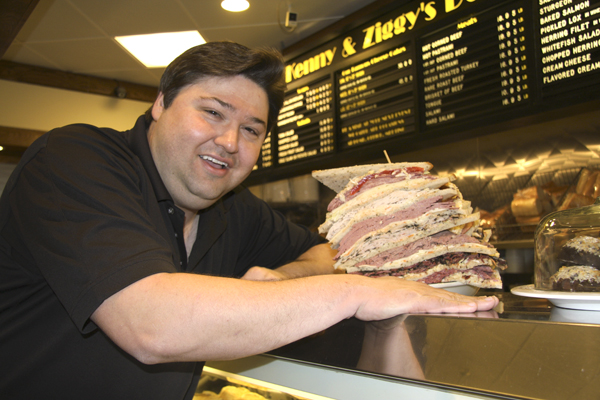Deli Man is an extra helping of more than just a nostalgic meal at one of the shrinking numbers of genuine Jewish delicatessens in North America. Like The Search for General Tso last year, on Chinese-American cuisine, and Jiro Dreams of Sushi (2011) in Japan, this is the latest delicious foodie documentary where restaurants illuminate ethnic/national cultures.
In each part of director Erik Greenberg Anjou’s trilogy on Jewish cultural touchstones (the others traced musical roots, in A Cantor’s Tale (2008) and The Klezmatics: On Holy Ground in 2010), he found a charming, informative tour guide with a personal investment in keeping alive a beloved past in the present and to preserve it for the future. In Houston, a city not known for its Jewish food, Ziggy Gruber at first seems like a surprising choice, based on his biography as the youngest chef training at London’s Cordon Bleu School and then his working in the same restaurants as Gordon Ramsey.
Like Proust and his madeleine, once Ziggy starts tasting food in the kitchen of his eponymous restaurant—cured and smoked meats (brisket, pastrami, and corned beef), with sides (including kugel and pickles), and desserts, like black-and-white cookies and ruggelah—he recalls warm memories of his Hungarian grandfather’s and uncles’ New York delicatessens. His passion for authentic Eastern European Ashkenazic recipes, especially in trying to recreate ones his grandfather wouldn’t pass on, would rouse anyone’s appetite. But surprises are in store when historians and other experts reveal that what today are seen as typical foods from 19th-century Jewish immigrants are not generally from the Old Country, but were specifically popularized by Romanians on New York’s Lower East Side.
Anjou eschews the kitschy shtick of Famous Sammy’s to find the dedicated inheritors of deli traditions handed down through the generations, most outside of Manhattan, even while paying tribute to Max Asnas’s classic Stage Delicatessen. (The requisite celebrities sharing their humorous memories, like Larry King and Jerry Stiller, mostly refer to the famous Stage, Carnegie, and Katz’s Delicatessens.)
Jay Parker, the éminence grise of my Queens icon Ben’s Best, describes exactly his relationship with customers: that we come to his establishment to feed our family through the stages of our life, from births to deaths, and throughout the year at the seasonal holidays. (We also always bring out-of-towners to eat there to experience the real thing.) Ziggy and his colleagues count only 120 authentic delicatessens left in North America, down from thousands. Gone are the days when my uncle could stop into a Bronx deli for a sandwich and find his father’s long-lost brother working behind the counter. Ziggy also visits one of the last smoke houses that supply lox, sable, white fish, and herring; it’s one kind of an essential but disappearing wholesaler.
Garnished with archival photographs, the film conducts in-depth interviews with “deli men” across North America (not all the hard-working descendants are men), from Detroit and Chicago to Beverly Hills, who seem to be genial raconteurs. They are also frank about their business problems. It seems that only those who own their real estate have the best chance of financial survival, while, for example, Wise Sons’ fusion approach in San Francisco and Caplansky’s use of social media in Toronto have successfully marketed the cuisine to new audiences. Some, like Ziggy’s, are not kosher, and all are making some healthy-oriented changes in their menus. Since the film was completed, though, another couple of delis have closed, including the only one in Portland, Maine.
Not focusing just on business, Anjou closely follows the personal life of his guide unfolding, as Ziggy’s lust for life and food brings a new woman into his life. Bringing the immigrant culture full circle, he marries at the Budapest synagogue where his grandfather/mentor had worshipped. Deli Man shows that a delicious way to understand a culture, whether you were familiar with it or not, can be through your stomach. You’ll want to take advantage of the special deals that theaters around the country are offering with local delicatessens, to fill up and to help fulfill their important culinary preservation.







Leave A Comment